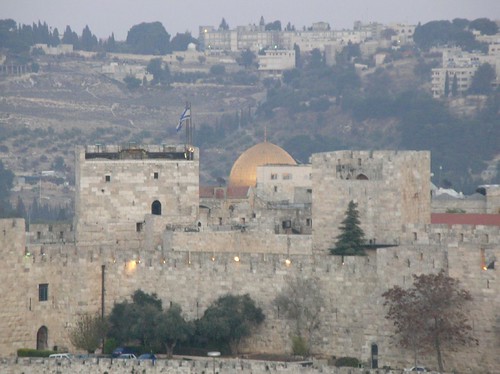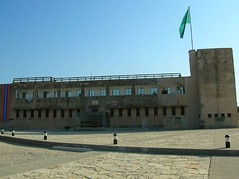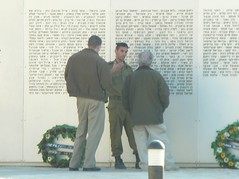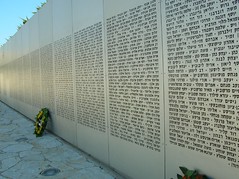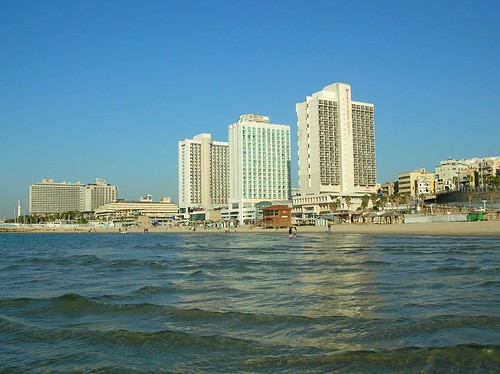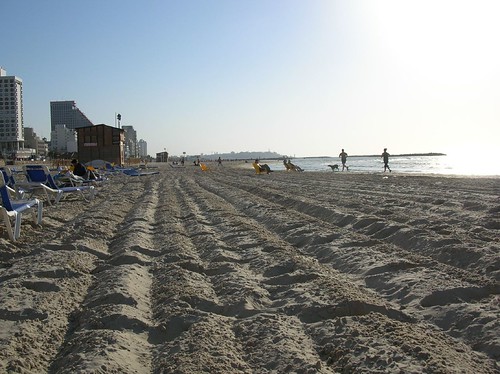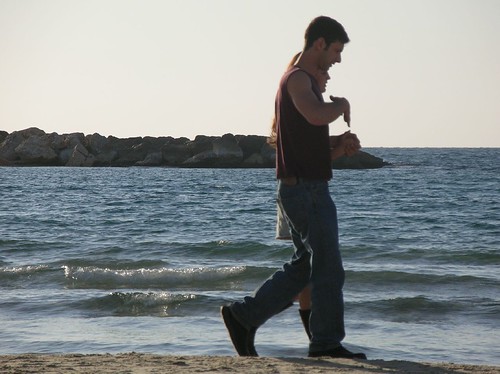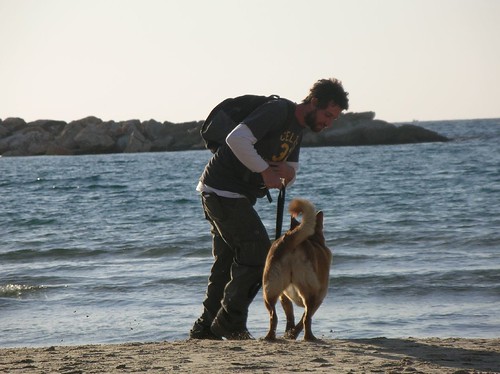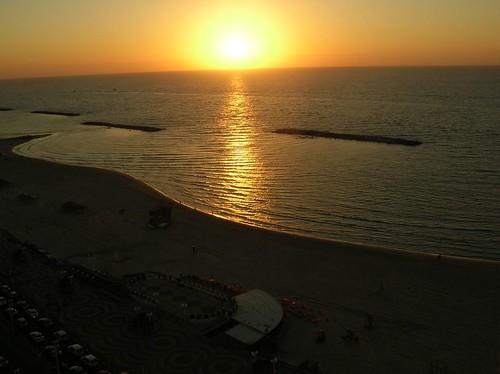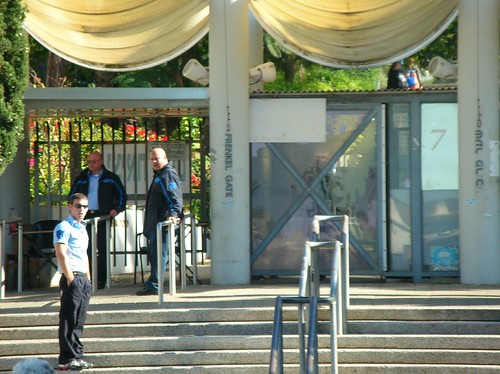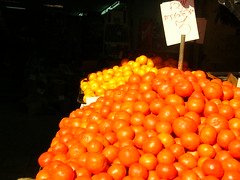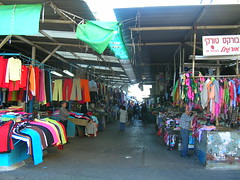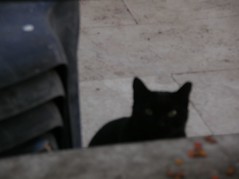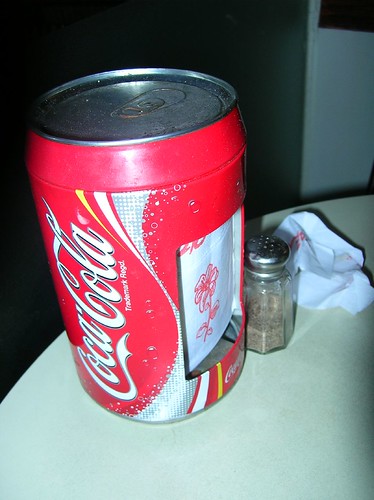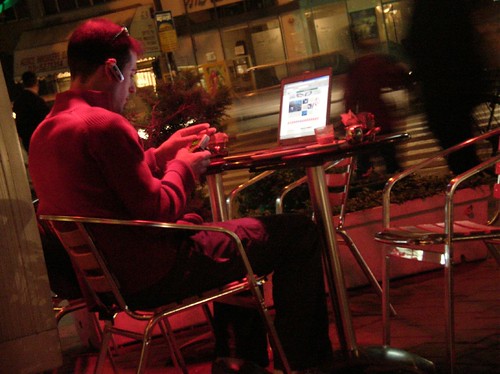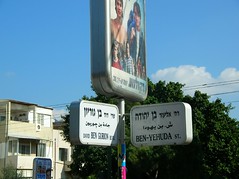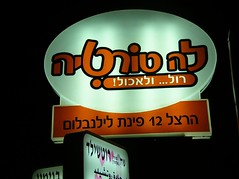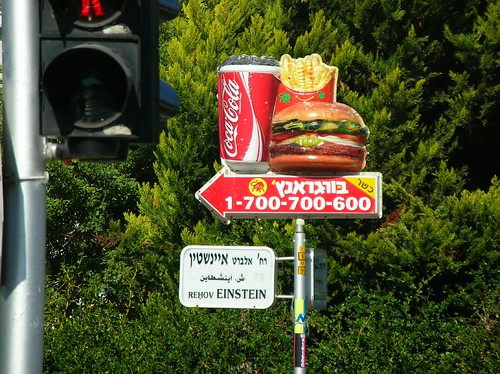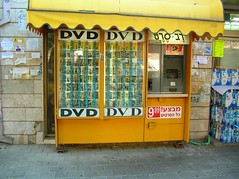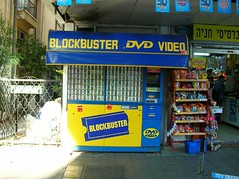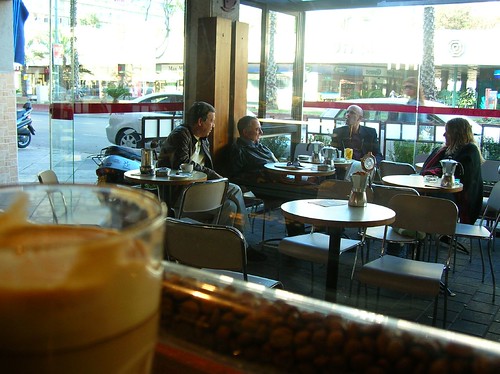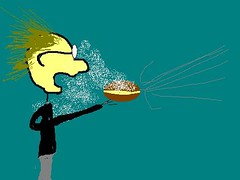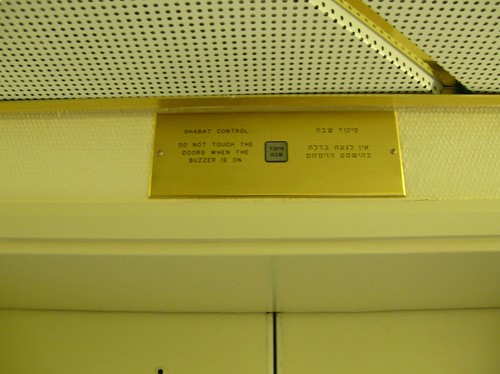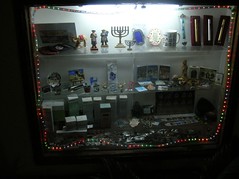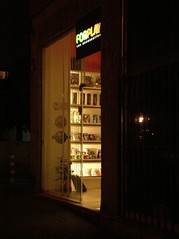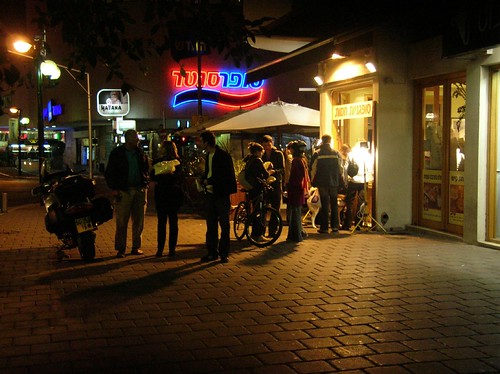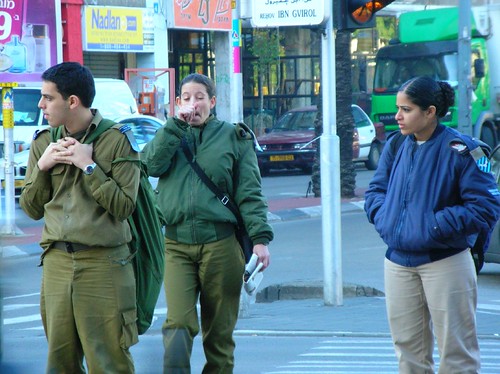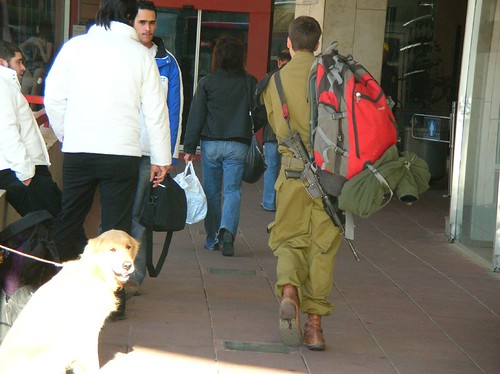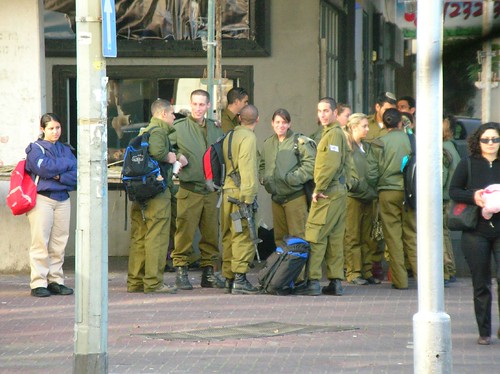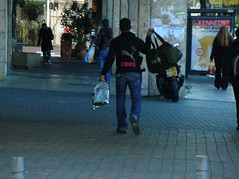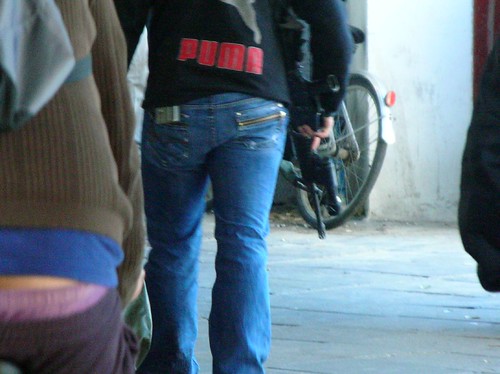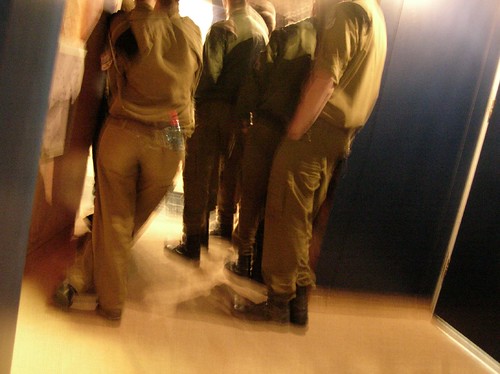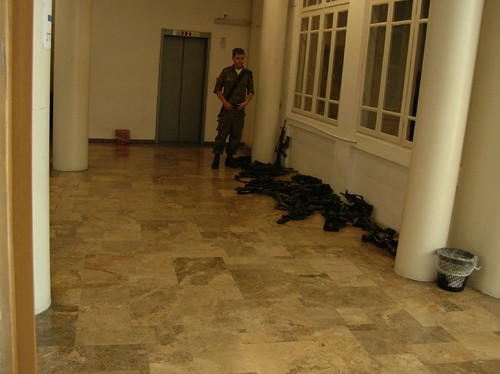Wednesday, December 27, 2006
White Christmas
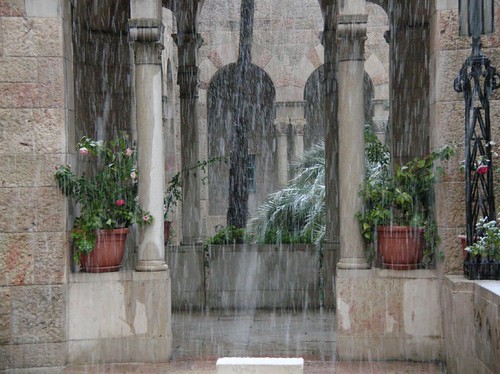
It's freakin' snowing in Jerusalem!
That's right. Big, wet, fluffy flakes, coming down for several hours and forming a sloppy, slushy accumulation of about an inch. The sidewalks, at least those paved with the smooth Jerusalem stones, became quite treacherous.
The snow is unusual, but not plague-of-locusts unusual. It happens about once a year, though usually the snow melts as soon as it hits the ground. Many Israelis seemed quite pleased with the snow -- at least the ones who weren't freaking out in their cars -- and I saw many grins and a few people throwing snowballs. Personally, I didn't care for weather in Jerusalem, even in December, to resemble February in New York City.
I was in the Old City when the snow began, shopping for scarves. I had left my camera behind, thinking it would be an impediment, as if I needed both hands free to deal with the shopkeepers. Rarely have I regretted the absence of my camera more. The sight of snowflakes wafting down narrow airshafts onto the sunwashed paving stones of the same streets where Jesus walked, was something I can barely describe and will always remember.
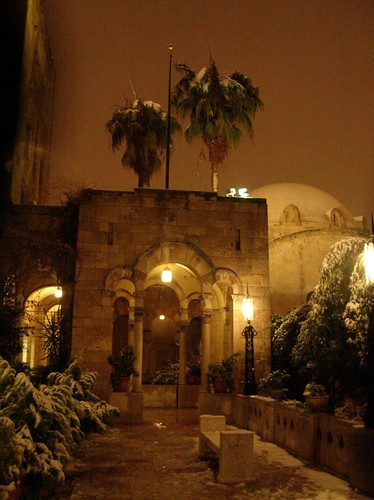
Snow on palm trees, YMCA, Jerusalem.
Why Jesus all of a sudden? The idea of a "white Christmas" is a relatively recent, northern European and North American association of ideas (made famous in song by the Jewish songwriter Irving Berlin). Even the traditional Christian portraits of Christ, which make him look more Danish than Judean, don't have snow in the background. So the incongruity of all this appeals to me.
I had thought of Christmas on this trip only by its absence. Last week, I was struck (though hardly surprised) by the fact that, with only a few shopping days until Christmas, the shopping malls in Israel didn't play Christmas music.
They did play a bit of Hanukkah music. Hanukkah is not a religiously important holiday in the Jewish calendar, but it's a fun holiday, and Israeli's observe it with a persistent but low key celebration. Occasional singing, and the common deployment of menorahs (called hanukkiot here, menorah being an ordinary 7-candle shabbat candelabrum). There was some nightly dancing by a gathering of haredi men at Dizengoff Circle in Tel Aviv. And of course the bakeries haul out the sufganiyot as a Hanukkah treat. But Hanukkah celebrating here has none of the totalitarian everywhereness of Christmas in the United States.
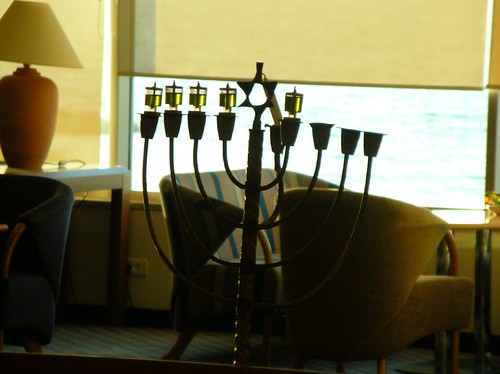
Hanukkiyah, Sheraton Tel Aviv lobby.
The YMCA, where I've been staying since Monday night, turns out to be a small enclave of Christianity in Jerusalem. They have a Christmas tree and, for the first time since I came to Israel, I was served bacon with breakfast. And lo and behold, this morning -- two days after Christmas -- they were playing Christmas carols in the breakfast room. I find many of the melodies of Christmas songs to be charming, even beautiful and moving, particularly if you don't listen to the words, and they were playing my favorite, Hark, the Herald Angels Sing.
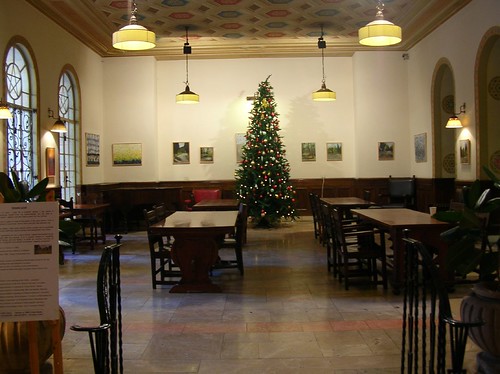
Christmas tree, Jerusalem YMCA lobby.
I think I missed Christmas music this year, and in retrospect, even Christmas, which is observed in my household as a secular winter festival. How fitting to feel this way in this city of interwoven religious paradoxes. And now, of course, the snow.
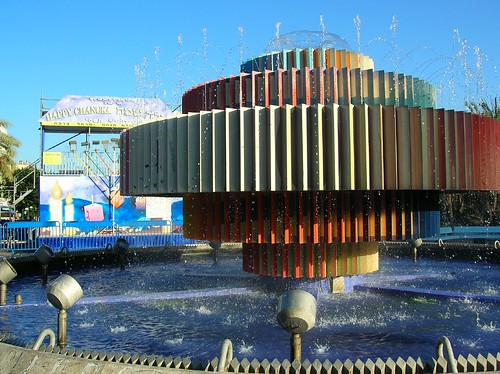
Above: The fountain at Dizengoff Circle. Inthe background, a large hanukkiyah and the stage where a haredi singer/entertainer led the men in dancing. Below: hanukkiyah at a hummus restaurant.

Labels: travel
Tuesday, December 26, 2006
My favorite Hebrew word
"Yesh" (pronounced "yaysh") is my favorite Hebrew word. It means "there is," but with a simple question-mark inflection, it means "is there?" So that, by simply adding a noun, you can make a sentence -- "is there breakfast?" -- to help make simple commercial transactions. Not always elegant or fluent, but it gets the job done.
You may be thinking, hey, this is just like "hay" in Spanish. But, wait, there's more (regah, yesh od.) The whole declension of the basic expression of possession -- I have, you have, etc. -- is made by adding a simple declined preposition to "yesh." Thus, "I have " is "yesh li," "he has" "yesh lo," (literally, "there is to me," "there is to him"), etc.
Finally, "yesh" said as an exclamation is a slang term expressing the sort of pleased excitement you feel on winning a prize, scoring a goal, and the like. In this sense, it's just the same as "yes" -- more accurately, "yesssss!" -- in American slang.
On my El Al flight to Tel Aviv, I watched an Israeli TV melodrama in which one of the main characters, on learning she has been selected as a contestant to an Israeli reality-TV "who will marry the batchelor" show, exlaims "yesh!" while making the (apparently universal) downward fist-pump. (It was the only complete sentence I understood without subtitles in the whole show.)
"Yesh" will only get you so far in Israel, however, and I now wish I'd be more diligent with, and spent more time on, my Hebrew studies. I learned enough Hebrew in the six months prior to my trip to be able to read street signs and slowly work my way through portions of a menu. I can say "please," "thank you," and "excuse me," get out the odd sentence here and say numbers (though I'm often slow to translate them in my head).
But beyond those things, my pronunciation must be really poor because I've found repeatedly that Israelis respond with incomprehension (there version of "huh?" or sometimes "mah zeh?", meaning "what's that?") when I try to say no brainers as "coffee with milk" or "Jerusalem."
Even worse, I can understand very little of what is said to me in Hebrew, even words and phrases I know. Of the four language skills of reading, writing, speaking and hearing, it's always been hardest for me to hear a language. This shortcoming checkmates any serious effort to say something, because if I were to produce a good Hebrew sentence, then naturally my Israeli interlocutor will produce one in return.
This isn't a major problem for getting around. A lot of menus, signs and things like ATM instructions provide English translations. And it seems as though about two thirds of the Israeli's I've encountered speak English ranging from workable to fluent, and most of the rest speak enough to get you through most of your interactions with them. Oddly, it was only the few times when I had to ask directions that my Israeli interlocutors professed to be unable to speak English.
Every now and then a transaction I expect would be manageable seems exceedingly with my extremely limited Hebrew. Buying gas was perhaps the most difficult thing I've done on this trip -- the pay at the pump system required inputting about five successive pieces of information onto a touchpad, which gave instructions only in Hebrew.
But the bigger issue has been more interpersonal. To generalize grossly, Israeli's seem to be rather aloof with strangers, though I get the impression from watching others interact that they are not unreceptive to persistent friendliness expressed in fluent Hebrew.
The trick is to have an encounter with a person who speaks little or no English and who has an incentive to take the time to understand and be understood by you. There have been a couple of times where this has happened and I more or less succeeded in communicating. Yesh!
You may be thinking, hey, this is just like "hay" in Spanish. But, wait, there's more (regah, yesh od.) The whole declension of the basic expression of possession -- I have, you have, etc. -- is made by adding a simple declined preposition to "yesh." Thus, "I have " is "yesh li," "he has" "yesh lo," (literally, "there is to me," "there is to him"), etc.
Finally, "yesh" said as an exclamation is a slang term expressing the sort of pleased excitement you feel on winning a prize, scoring a goal, and the like. In this sense, it's just the same as "yes" -- more accurately, "yesssss!" -- in American slang.
On my El Al flight to Tel Aviv, I watched an Israeli TV melodrama in which one of the main characters, on learning she has been selected as a contestant to an Israeli reality-TV "who will marry the batchelor" show, exlaims "yesh!" while making the (apparently universal) downward fist-pump. (It was the only complete sentence I understood without subtitles in the whole show.)
"Yesh" will only get you so far in Israel, however, and I now wish I'd be more diligent with, and spent more time on, my Hebrew studies. I learned enough Hebrew in the six months prior to my trip to be able to read street signs and slowly work my way through portions of a menu. I can say "please," "thank you," and "excuse me," get out the odd sentence here and say numbers (though I'm often slow to translate them in my head).
But beyond those things, my pronunciation must be really poor because I've found repeatedly that Israelis respond with incomprehension (there version of "huh?" or sometimes "mah zeh?", meaning "what's that?") when I try to say no brainers as "coffee with milk" or "Jerusalem."
Even worse, I can understand very little of what is said to me in Hebrew, even words and phrases I know. Of the four language skills of reading, writing, speaking and hearing, it's always been hardest for me to hear a language. This shortcoming checkmates any serious effort to say something, because if I were to produce a good Hebrew sentence, then naturally my Israeli interlocutor will produce one in return.
This isn't a major problem for getting around. A lot of menus, signs and things like ATM instructions provide English translations. And it seems as though about two thirds of the Israeli's I've encountered speak English ranging from workable to fluent, and most of the rest speak enough to get you through most of your interactions with them. Oddly, it was only the few times when I had to ask directions that my Israeli interlocutors professed to be unable to speak English.
Every now and then a transaction I expect would be manageable seems exceedingly with my extremely limited Hebrew. Buying gas was perhaps the most difficult thing I've done on this trip -- the pay at the pump system required inputting about five successive pieces of information onto a touchpad, which gave instructions only in Hebrew.
But the bigger issue has been more interpersonal. To generalize grossly, Israeli's seem to be rather aloof with strangers, though I get the impression from watching others interact that they are not unreceptive to persistent friendliness expressed in fluent Hebrew.
The trick is to have an encounter with a person who speaks little or no English and who has an incentive to take the time to understand and be understood by you. There have been a couple of times where this has happened and I more or less succeeded in communicating. Yesh!
Labels: travel
Monday, December 25, 2006
Jerusalem -- Christmas Day
If you're Jewish, you should spend Christmas day in Israel at least once in your life. You can then have the experience of really feeling yourself to be in the religious majority for a change.
In Jerusalem, as throughout Israel, Christmas is a day just like any other. The banks are open. Obviously, the various Christian holy places will be different, but I didn't visit any of those. I did, however, go to a bank.
And yet, no day in Jerusalem can be called "a day just like any other." I'll have more to blog about Jerusalem, but for now I leave you with this photo. I call it: "Outside the Jaffa Gate: Man carrying two wooden doors on his head while talking on cell phone and smoking cigarette."*
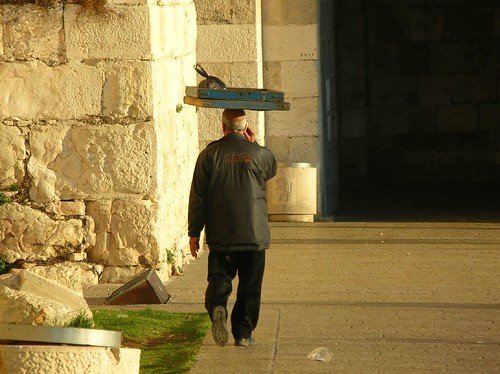
*See no. 4 in this post.
In Jerusalem, as throughout Israel, Christmas is a day just like any other. The banks are open. Obviously, the various Christian holy places will be different, but I didn't visit any of those. I did, however, go to a bank.
And yet, no day in Jerusalem can be called "a day just like any other." I'll have more to blog about Jerusalem, but for now I leave you with this photo. I call it: "Outside the Jaffa Gate: Man carrying two wooden doors on his head while talking on cell phone and smoking cigarette."*

*See no. 4 in this post.
Sunday, December 24, 2006
Evidence of the existence of God?
Jerusalem, the Old City. The gold dome is the Dome of the Rock on the Temple Mount.
I'm in Jerusalem, and as dusk settles over the city, I can hear church bells and the keening song from the crier outside the mosque of the Old City.
My reservation at the Jerusalem YMCA on King David Street starts Christmas Day, but having tired of Eilat, the cheesy Red Sea resort where I'd holed up the past two days, I desperately wanted to get to Jerusalem a day early.
But the YMCA was booked. I was concerned that, as a Christian holy place with a world famous midnight mass, Jerusalem might be a tough city for last minute hotel reservations on Christmas Eve. I called half a dozen other hotels -- even the King David, Israel's premier hotel, where visiting heads of state, royalty and celebrities always stay. Fully booked.
On a hunch, I took a shot at booking a room at the King David through an Israeli travel website. Perhaps they have access to a block of rooms that the hotel won't book directly. Bingo.
The King David is elegance itself. And it's right across a narrow street from the YMCA... which means tomorrow, when I change hotels, I need only walk about 100 yards from one reception desk to the other. And as if all this weren't enough (dayainu!), when I checked in at the King David they informed me they were giving me a free room upgrade -- to a deluxe room with a view of the Old City. Hence the photo above, taken from my window.
My prayers answered in Jerusalem.
Saturday, December 23, 2006
Tanks for the memories
The Armored Corps Museum at Latrun
Latrun is a hilltop town halfway between Tel Aviv and Jerusalem. Because of its strategic location, commanding what at one time was the only road to Jerusalem from the main Mediterranean port at Jaffa (next to Tel Aviv), the British built a fortified police station there in the 1930s as part of its occupation of Palestine. When they withdrew in 1947, the Latrun fort was taken over by the Jordanian army from which vantage point it cut the road to Jerusalem during the Israeli War of Independence in 1948.
So strategically important was Latrun that the Israelis launched three separate assaults against the fort, ultimately failing to take it after suffering heavy casualties. Instead, they were only able to relieve the seige of Jerusalem by building a new road, dubbed the Burma Road, which was protected by hills from the guns at the Latrun fort. Latrun ultimately fell into Israeli hands only during the Six Day War in 1967.
Now the Latrun fort is the home of a small military installation, as well as the Armored Corps Museum. This museum has 120 tanks and armored fighting vehicles on display, the largest collection of its kind in the world. I took advantage of the fact that I'm traveling alone by looking at, I'm pretty sure, every one of them. It was two hours well spent.
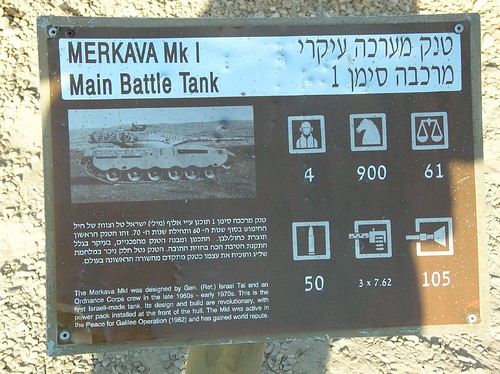
Each tank had an extremely informative identifying plaque, like this.

I love this artifiact of war surplus. An early vietnam-era tank gets mothballed
by the U.S. army and sent to "Isreal."
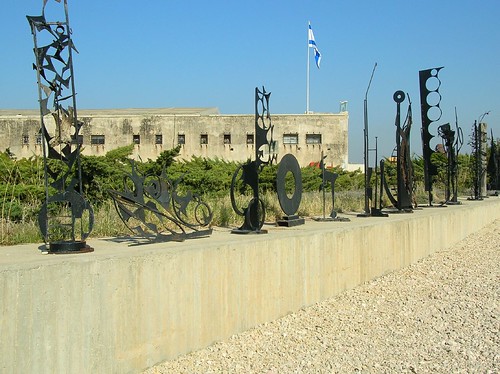
Swords into plowshares: you have to love a military museum that exhibits sculptures
made from scrap armor plating and tank parts.

Swords into bird roosts. This WWII era Sherman Tank sits atop a high pedestal,
which I guess makes it attractive to birds.
Latrun is a hilltop town halfway between Tel Aviv and Jerusalem. Because of its strategic location, commanding what at one time was the only road to Jerusalem from the main Mediterranean port at Jaffa (next to Tel Aviv), the British built a fortified police station there in the 1930s as part of its occupation of Palestine. When they withdrew in 1947, the Latrun fort was taken over by the Jordanian army from which vantage point it cut the road to Jerusalem during the Israeli War of Independence in 1948.
So strategically important was Latrun that the Israelis launched three separate assaults against the fort, ultimately failing to take it after suffering heavy casualties. Instead, they were only able to relieve the seige of Jerusalem by building a new road, dubbed the Burma Road, which was protected by hills from the guns at the Latrun fort. Latrun ultimately fell into Israeli hands only during the Six Day War in 1967.
The "Wall of Memory," with names of Israeli soldiers killed in the nation's wars.
Now the Latrun fort is the home of a small military installation, as well as the Armored Corps Museum. This museum has 120 tanks and armored fighting vehicles on display, the largest collection of its kind in the world. I took advantage of the fact that I'm traveling alone by looking at, I'm pretty sure, every one of them. It was two hours well spent.

Each tank had an extremely informative identifying plaque, like this.

I love this artifiact of war surplus. An early vietnam-era tank gets mothballed
by the U.S. army and sent to "Isreal."

Swords into plowshares: you have to love a military museum that exhibits sculptures
made from scrap armor plating and tank parts.

Swords into bird roosts. This WWII era Sherman Tank sits atop a high pedestal,
which I guess makes it attractive to birds.
Labels: travel
Friday, December 22, 2006
Tel Aviv, the beach town
When I first planned this trip, I was going to be in Israel late July/ early August, and was insistently told it would be hot. I assumed that this Mediterranean, subtropical climate would still be warmish now, at the end of fall, beginning of winter. I packed short sleeved shirts and doggedly clung to the notion that there would be beach weather – the low end of the range to be sure, but warm enough that I would want to swim in the Mediterranean and Red Seas.
What was it about lows in the high 40s that I didn’t understand?
It was a mere fortuity that I brought my polypro jacket (the one I use as the liner to outer shell for skiing), and I have gotten lots of use out of it, sometimes even on top of my lighter polypro sweater.
Not that I’m complaining – it has been very pleasant shirtsleeve-and-sweater weather, even in the desert, which is ideal for sightseeing. Tel Aviv turns out to be one of those cities, like San Francisco through much of the year, and LA in the dead of winter – where you can be hot and cold at the same time. The sun is so bright that it heats you up, but the frequent breezes have a distinct chill. As a result, you find yourself sweating in your sweater, but cold without it, so you’re constantly toggling your layers.
Anyway, I’m a guy who will be damned if he’s going to skip the beach, and after two days of excessive walking around, I fell into a daily beach routine my last three days in Tel Aviv.
The view from where I sit. Despite that late-afternoon-looking sun, it
was only about 2:30, but the days are very short about now.
was only about 2:30, but the days are very short about now.
Basically, I did an early shift of sightseeing, and then went to the beach for the warmest part of the day to grab a beach chair. Within a few minutes the chair guy would swing buy and charge 6 shekels for the chair for the day. After that, I'd wade a few minutes, then plop down in the beach chair to read and people watch for a couple of hours.
In this position, I dressed for the beach like they did in the 19th century when they believed you would catch a chill and die if you had wet exposed skin: long pants, the polypro sweater and, eventually, the polypro jacket, both zipped up to the top.

I love this type of wave pattern: the breakwater causes the waves to come in from two sides,
approaching each other almost at right angles, making little parallelograms. I waded to within a stone's throw of that breakwater to take some pictures of the beachfront.
Great views, though.
View of the beach from my room at sundown. My chair would be
in the lower right quadrant of the photo.
in the lower right quadrant of the photo.
Thursday, December 21, 2006
Security update
Tel Aviv University. Seconds later, the guard in the foreground
informed me that picture-taking was not allowed on the campus.
informed me that picture-taking was not allowed on the campus.
“You want to take the bus?” said the hotel desk clerk in response to my question, “what bus can I take from near here to get to Tel Aviv University?”
I figured her implication was “tourists like you take a taxi because they lavish money on hotel rooms, so why save a few shekels on transportation?” rather than “tourists like you take a taxi because why risk yourself unnecessarily on the bus?”
I’ve decided not to make a thing about riding on buses in Israel, at least outside Jerusalem. (Even my Israeli friends back home said, “uh, maybe you don’t need to ride the buses in Jerusalem – you can take taxis.” Though perhaps they are being overly cautious on my behalf.) Rationally, the likelihood of being a victim of a terrorist act here is lower than that of being a victim of some sort of street crime or injury accident in large American cities. But highly publicized suicide bombings on buses in Israel since the eruption of the second Intifada in 2000 leave a mental impression. There’s an actual name for the syndrome of overestimating risks based on shocking anecdotes.
Anyway, you walk freely onto intracity buses in Tel Aviv (intercity buses are another matter – I’m told the bus station with service to Jerusalem has airport-style security). And, thus, the web of security arrangements I’ve experienced so far remains something of a puzzle to me. The story so far:
- Intensive security interview at airline check-in.At Tel Aviv University, the entrance gate had three security guards standing in front of one of those floor-to-ceiling inter-meshing turnstiles you see in the New York City subways. After snapping this photo of it, the security guard in front walked up to me and politely, but firmly explained that picture- taking was forbidden at the University. I can only assume it’s a security measure, on the theory that photos of the grounds would be useful for planning terror acts on the campus. That made me sad.
- Security guards in some, but not most, busy shops, grocery stores, and restaurants.
- One-at-a-time entrance gate with metal detector wand over torso for downtown shopping mall.
- Random bag inspections at any of these places – no consistent pattern, except for more institutional buildings, which always search, though with varying degrees of thoroughness
At the risk of sounding cliche, the question of security versus freedom is one of life’s great mysteries, right up there with “why do we die, and what happens thereafter?”, “why do bad things happen to good people?”, “why aren’t more women sexually attracted to me?”, and “why do I care so much about that last one?” The tradeoff between security and freedom is probably the fundamental question of government. In the U.S. it seems to be constantly at least in the back of our minds; here in Israel, I find it pushed a bit further to the front.
Half the stories in the Israeli newspapers deal with security in some sense, but two in today’s paper showed how Israelis struggle to keep a balance. A broad security-based ban on Palestinian students studying in Israel was overturned as “unreasonable” by the Israeli High Court of Justice. And Israel’s Mossad (intelligence) chief, Meir Dagan, told the Knesset yesterday that Iran will not get a nuclear bomb before 2009, so that there is plenty of time for diplomatic efforts to block Iran’s nuclear program.
So, you see, it’s not all doom and gloom. And my bus ride was very pleasant.
Wednesday, December 20, 2006
Vendors 2, Oscar Madison 0
I had just gotten of the plane my first morning in Tel Aviv and was already in the jet lag zone, wearying myself further by walking from the train station with my luggage and getting a bit lost on the way to my hotel.
I just wanted a shower and bed, but an alluring fruit stand stood in my way. The two Jaffa oranges and a red grapefruit seemed a bit pricey at 14 shekels, but my mind too fogged to figure out whether I was getting ripped off. The oranges seemed to be going for 6 shekels -- but the unit of weight was mysterious. Could it be kilos? Shekels divided by four equals dollars, and kilos are 2.2 lbs.
The cross-cutting arithmetic would have been difficult even had I been at my alert best, so I dealth with the problem by saying, "hey, I'll take two of those bottles of water."
Now the price was up to 32 shekels. "Are the water bottles 9 shekels a piece?" I asked, figuring that a litre of bottled water does cost over $2 at overpriced convenience stores... and this was a convenient two blocks from my hotel.
But the vendor, talking fast, had moved on to how great the dates were, and the figs and dried apricots, and everything is going to be closed at sundown for shabbat, so I'll starve. He started handing me free tastes.
"Okay, uh, those dates."
He scooped a handful into a bag, weighed them, and announced the total for my entire purchase: 64 shekels. I was grateful to be on my way.
After a shower and a nap, I went back over the incident. Basically, I had paid $16 in that store, about $3.50 for the citrus fruit -- about what you'd pay in a New York City fruit stand, where the citrus has to travel at on average a thousand miles to get there -- and about $8 for maybe a pound of dates, which frankly I don't even like that much. Clearly, the man was naming prices that would be considered random but for their uniform high-ness. It took some serious meditation to convince myself to let go of that one.
I have no excuse for the Carmel Street market incident. I quickly translated from shekels to dollars as the vendor named a price for the kippa (yarmulke) -- an item I would be needing to visit various synagogues and the Western Wall. But the price sounded reasonable for the item, and I just paid it. Less than an hour later, walking past a religious aritcle shop, a saw a bin of kippas and realized that I paid the market vendor 33% more than I would have paid in a shop!
There of all places I should have known that it's my duty not to accept the quoted price. Considering that the price difference amounted to 50 cents, it wasn't exactly a big deal, but it's the principle of the thing.
I just wanted a shower and bed, but an alluring fruit stand stood in my way. The two Jaffa oranges and a red grapefruit seemed a bit pricey at 14 shekels, but my mind too fogged to figure out whether I was getting ripped off. The oranges seemed to be going for 6 shekels -- but the unit of weight was mysterious. Could it be kilos? Shekels divided by four equals dollars, and kilos are 2.2 lbs.
The cross-cutting arithmetic would have been difficult even had I been at my alert best, so I dealth with the problem by saying, "hey, I'll take two of those bottles of water."
Now the price was up to 32 shekels. "Are the water bottles 9 shekels a piece?" I asked, figuring that a litre of bottled water does cost over $2 at overpriced convenience stores... and this was a convenient two blocks from my hotel.
But the vendor, talking fast, had moved on to how great the dates were, and the figs and dried apricots, and everything is going to be closed at sundown for shabbat, so I'll starve. He started handing me free tastes.
"Okay, uh, those dates."
He scooped a handful into a bag, weighed them, and announced the total for my entire purchase: 64 shekels. I was grateful to be on my way.
After a shower and a nap, I went back over the incident. Basically, I had paid $16 in that store, about $3.50 for the citrus fruit -- about what you'd pay in a New York City fruit stand, where the citrus has to travel at on average a thousand miles to get there -- and about $8 for maybe a pound of dates, which frankly I don't even like that much. Clearly, the man was naming prices that would be considered random but for their uniform high-ness. It took some serious meditation to convince myself to let go of that one.
These oranges at the Carmel Market look much better than those at the ripoff shop.
Note the price: 3.50 shekels, but for what amount of fruit?
Not knowing this places one at a real bargaining disadvantage.
Note the price: 3.50 shekels, but for what amount of fruit?
Not knowing this places one at a real bargaining disadvantage.
I have no excuse for the Carmel Street market incident. I quickly translated from shekels to dollars as the vendor named a price for the kippa (yarmulke) -- an item I would be needing to visit various synagogues and the Western Wall. But the price sounded reasonable for the item, and I just paid it. Less than an hour later, walking past a religious aritcle shop, a saw a bin of kippas and realized that I paid the market vendor 33% more than I would have paid in a shop!
Clothing stalls at the Carmel market.
There of all places I should have known that it's my duty not to accept the quoted price. Considering that the price difference amounted to 50 cents, it wasn't exactly a big deal, but it's the principle of the thing.
Labels: travel
Feather pillows
I don't know whether it's just a cultural thing, or whether there's some religious law in play, this trip has reminded me that we Jews love our feather pillows. My archetypal picture of Jewish refugees, as described to me years ago by my mother, has them carrying a few prized possessions, including their down pillows.
I hadn't thought about this for years, and I myself tend to use a synthetic hollow-fill pillow. But I was pleasantly surprised by the big, soft down pillows at the Tel Aviv Sheraton. This is because chain hotel pillows these days tend to be hollow-fill monstrosities that are so bulky that your head feels like it's on a separate floor when you lie down on them. But the Tel Aviv Sheraton down pillows softly flattened out to the perfect height.
Well get this: the pillows on my El Al flight to Tel Aviv were, of all things, down.
I hadn't thought about this for years, and I myself tend to use a synthetic hollow-fill pillow. But I was pleasantly surprised by the big, soft down pillows at the Tel Aviv Sheraton. This is because chain hotel pillows these days tend to be hollow-fill monstrosities that are so bulky that your head feels like it's on a separate floor when you lie down on them. But the Tel Aviv Sheraton down pillows softly flattened out to the perfect height.
Well get this: the pillows on my El Al flight to Tel Aviv were, of all things, down.
Labels: travel
Tuesday, December 19, 2006
Stray katz
Ten random observations from Tel Aviv
1. Is there a stray cat problem in Tel Aviv? You see cats all over the place. People put food out form them. It can't just be domesticated pets that get let out, can it?
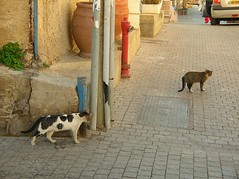
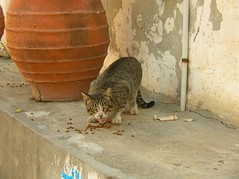
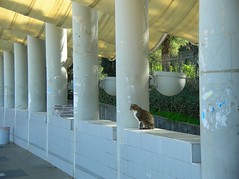
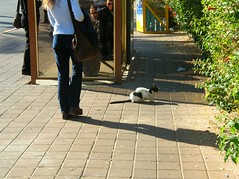
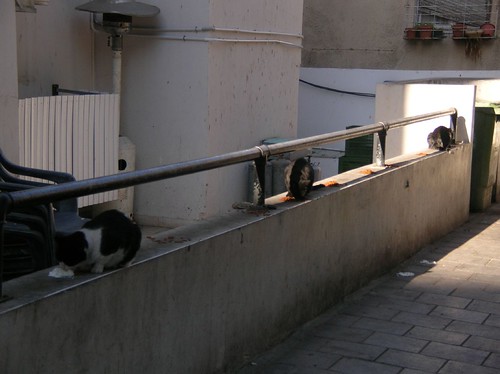
Random thought #1a: the hero of my spy novel will be named Ferrell Katz.
2. Israeli fathers seem to be very physically affectionate with their children.
3. People here smoke their heads off. They're allowed to smoke most places, and pretty much they do. The big shopping mall in town had a fug like a smokey bar.
4. At any given moment, one out of every two Israelis in Tel Aviv is either smoking a cigarette or talking on a cell phone. Or both.
5. Tel Aviv street signs for major streets have interior neon lighting and are topped off with advertizements.
6. Where street parking is permitted, the curb is painted blue and white. That's most curbs. I guess the blue-and-white paint lobby is very powerful here.
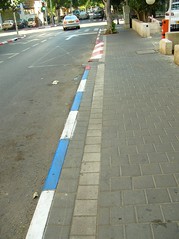
7. In Tel Aviv, you can rent movies on DVD from machines on the street. "A-DVD-Ms"?
8. Tel Avivis love their dogs. Like Parisians, they take them into cafes, and frequently don't clean up after them.
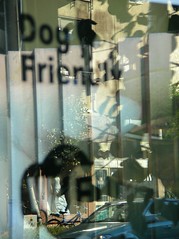
Stenciled on a cafe window: "Dog Friendly."
1. Is there a stray cat problem in Tel Aviv? You see cats all over the place. People put food out form them. It can't just be domesticated pets that get let out, can it?





Random thought #1a: the hero of my spy novel will be named Ferrell Katz.
2. Israeli fathers seem to be very physically affectionate with their children.
3. People here smoke their heads off. They're allowed to smoke most places, and pretty much they do. The big shopping mall in town had a fug like a smokey bar.
The top of this stylized Coke-can napkin dispenser has plainly been used as an ashtray.
4. At any given moment, one out of every two Israelis in Tel Aviv is either smoking a cigarette or talking on a cell phone. Or both.
5. Tel Aviv street signs for major streets have interior neon lighting and are topped off with advertizements.
6. Where street parking is permitted, the curb is painted blue and white. That's most curbs. I guess the blue-and-white paint lobby is very powerful here.

7. In Tel Aviv, you can rent movies on DVD from machines on the street. "A-DVD-Ms"?
Even Blockbuster is in on this.
8. Tel Avivis love their dogs. Like Parisians, they take them into cafes, and frequently don't clean up after them.

Stenciled on a cafe window: "Dog Friendly."
9. On the many divided streets in Tel Aviv, the "walk/don't walk" lights routinely let you get halfway across and then stop you on the median strip.
10. There are cafes everywhere. Some sidewalk cafes have these nifty windowed partitions to keep the car and bus exhaust fumes out of your face. The pedestrians stroll past between your table and the cafe storefront.
10. There are cafes everywhere. Some sidewalk cafes have these nifty windowed partitions to keep the car and bus exhaust fumes out of your face. The pedestrians stroll past between your table and the cafe storefront.
Monday, December 18, 2006
That's a plan
Shabbat control
Many of Shabbat's strictures that go beyond store closings are publicly observed. It's a complicated set of rules, with many extenuations, made more complicated by the web of varying rabbinic interpretations plus the accommodating and ignoring of the rules that goes on in this officially religious but also very secular country. For instance, buses don't run, but taxicabs do.
Presumably, activating the "shabbat control" turns this
ordinary hotel elevator into a "shabbat elevator."
ordinary hotel elevator into a "shabbat elevator."
I don't pretend to understand the nuances of how this tradition is practiced. I was interested (though confused) about the lights. According to Wikipedia:
Another example [of activity forbidden on shabbat] is the prohibition (according to Orthodox and some Conservative rabbinic authorities) against turning electric devices on or off, which is derived from one of the "39 categories of work (melachot)". However, the authorities are not in agreement about exactly which category (or categories) this would fall under. One view is that tiny sparks are created in a switch when the circuit is closed, and this would constitute "lighting a fire" (category 37). If the appliance is one whose purpose is for light or heat (such as an incandescent lightbulb or electric oven) then the lighting or heating elements may be considered as a type of fire; if so, then turning them on constitutes both "lighting a fire" (category 37) and "cooking" (a form of baking, category 11), and turning them off would be "extinguishing a fire" (category 36). Another view is that a device which is plugged into an electrical outlet of a wall becomes part of the building, but is nonfunctional while the switch is off; turning it on would then constitute "building" and turning it off would be "demolishing" (categories 35 and 34). A common solution involves pre-set timers for electric appliances, to turn them on and off automatically, with no human intervention on Shabbat itself.What I noticed walking around is that some streetlights were off Friday night and on Saturday night. Many stores that were closed both Friday and Saturday nights kept their lights off Friday night.
These two stores observed melachot by keeping their lights off Friday
night and turning them back on, even when closed, after shabbat.
Left: a judaica gift shop. Right: a sex toy store called "Forplay."
night and turning them back on, even when closed, after shabbat.
Left: a judaica gift shop. Right: a sex toy store called "Forplay."
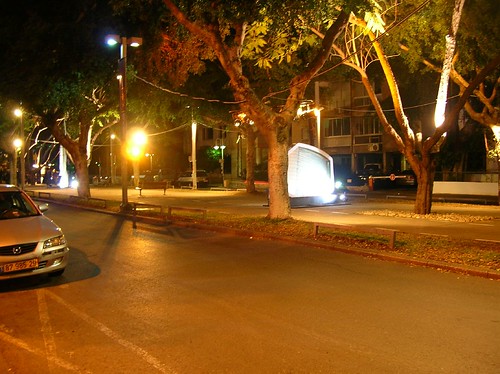
Rothschild Street. This street was minimally lit Friday night,
and the outdoor exhibit in the parkway completely dark.
Saturday day had the look and feel of a Sunday in the U.S. with people walking in parks and hanging out in cafes, but the commercial streets remained quiet.
Saturday, after sundown, these parts of the city woke up, as a number of businesses re-opened for a few Saturday night hours.
Tel Avivis line up for post-shabbat sufganiyot (jelly donuts)
on Dizengoff St., just near the central downtown shopping mall.
on Dizengoff St., just near the central downtown shopping mall.
When you think about it, the distinction between and Saturday and a Sunday sabbath is arbitrary, and so the name of the first work day after sabbath is equally arbitrary. And since sabbath here is Saturday, it is only logical that Sunday is a school and work day... the beginning of the work week in fact. And yet it felt weird to me to see the workday bustle on Sunday morning. My ingrained social clock, I guess.
Sunday, December 17, 2006
Nice Jewish boys and girls -- with guns
Uniformed Israeli Defense Force soldiers on leave are a ubiquitous sight around here. In contrast to the "volunteer army" in the U.S., the IDF is drawn from all segments of society because of nationwide compulsory service. Their morale and fighting discipline is not made to depend on forming them as "a breed apart" from civilians, and so they move comfortably among civilians as they enjoy their weekend leave. They have a casual relaxed air, comfortable in the knowledge that they're well regarded by the people around them and that they're not subject to rigid, spit-and-polish discipline. (Not insignificantly, military law in Israel embodies the "Nuremburg principle" allowing soldiers to question and disobey arguably illegal orders.)
You see them in various states of uniform dress -- sometimes, full battle dress with combat boots, but other times with running shoes or other items of civilian garb. Their backpacks and duffle bags look like personal property purchased in a hiking store rather than army issue.
It really is a true citizen army: except for the uniforms, or parts of uniforms, they look just like anyone else in their early 20s, and you can easily imagine them hanging around a shopping mall, or waiting tables, or sitting in college classes.
Oh, yeah -- that and the guns. Many of the soldiers carry their automatic rifles with them on leave. That's a sight that takes some getting used to, I must admit. I guess its a function of a small country with a relatively small population and a history of military emergencies. You're always near a potential battlefront.
Had I been quicker with the camera, I would have gotten photo that says it all: a woman soldier walking out of the Carmel Market holding a just-purchased pink bookshelf in one hand, and the other hand on an M16 in firing position at her hip.
Above: a group of soldiers congregating, I surmise, to catch
transportation back to the base after a Shabbat (weekend) leave.
Below: casual attire. That's either an I-pod or an ammo clip in the left pocket.
transportation back to the base after a Shabbat (weekend) leave.
Below: casual attire. That's either an I-pod or an ammo clip in the left pocket.
What do Israeli soldiers do on leave? Why, visit the IDF museum, of course. Here, they listen with polite interest to the museum guide.
Below: museum patrons are required to check their automatic weapons at the entrance. I'm pleased to see that they posted a guard.
Subscribe to Comments [Atom]
